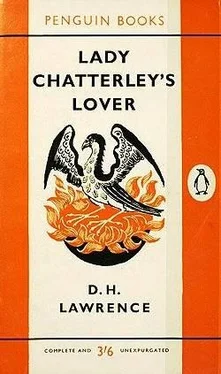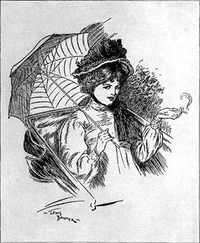And thus far it was a life: in the void. For the rest it was non-existence. Wragby was there, the servants…but spectral, not really existing. Connie went for walks in the park, and in the woods that joined the park, and enjoyed the solitude and the mystery, kicking the brown leaves of autumn, and picking the primroses of spring. But it was all a dream; or rather it was like the simulacrum of reality. The oak-leaves were to her like oak-leaves seen ruffling in a mirror, she herself was a figure somebody had read about, picking primroses that were only shadows or memories, or words. No substance to her or anything…no touch, no contact! Only this life with Clifford, this endless spinning of webs of yarn, of the minutiae of consciousness, these stories Sir Malcolm said there was nothing in, and they wouldn't last. Why should there be anything in them, why should they last? Sufficient unto the day is the evil thereof. Sufficient unto the moment is the appearance of reality.
Clifford had quite a number of friends, acquaintances really, and he invited them to Wragby. He invited all sorts of people, critics and writers, people who would help to praise his books. And they were flattered at being asked to Wragby, and they praised. Connie understood it all perfectly. But why not? This was one of the fleeting patterns in the mirror. What was wrong with it?
She was hostess to these people…mostly men. She was hostess also to Clifford's occasional aristocratic relations. Being a soft, ruddy, country-looking girl, inclined to freckles, with big blue eyes, and curling, brown hair, and a soft voice, and rather strong, female loins she was considered a little old-fashioned and 'womanly'. She was not a 'little pilchard sort of fish', like a boy, with a boy's flat breast and little buttocks. She was too feminine to be quite smart.
So the men, especially those no longer young, were very nice to her indeed. But, knowing what torture poor Clifford would feel at the slightest sign of flirting on her part, she gave them no encouragement at all. She was quiet and vague, she had no contact with them and intended to have none. Clifford was extraordinarily proud of himself.
His relatives treated her quite kindly. She knew that the kindliness indicated a lack of fear, and that these people had no respect for you unless you could frighten them a little. But again she had no contact. She let them be kindly and disdainful, she let them feel they had no need to draw their steel in readiness. She had no real connexion with them.
Time went on. Whatever happened, nothing happened, because she was so beautifully out of contact. She and Clifford lived in their ideas and his books. She entertained…there were always people in the house. Time went on as the clock does, half past eight instead of half past seven.
Connie was aware, however, of a growing restlessness. Out of her disconnexion, a restlessness was taking possession of her like madness. It twitched her limbs when she didn't want to twitch them, it jerked her spine when she didn't want to jerk upright but preferred to rest comfortably. It thrilled inside her body, in her womb, somewhere, till she felt she must jump into water and swim to get away from it; a mad restlessness. It made her heart beat violently for no reason. And she was getting thinner.
It was just restlessness. She would rush off across the park, abandon Clifford, and lie prone in the bracken. To get away from the house…she must get away from the house and everybody. The work was her one refuge, her sanctuary.
But it was not really a refuge, a sanctuary, because she had no connexion with it. It was only a place where she could get away from the rest. She never really touched the spirit of the wood itself…if it had any such nonsensical thing.
Vaguely she knew herself that she was going to pieces in some way. Vaguely she knew she was out of connexion: she had lost touch with the substantial and vital world. Only Clifford and his books, which did not exist…which had nothing in them! Void to void. Vaguely she knew. But it was like beating her head against a stone.
Her father warned her again: 'Why don't you get yourself a beau, Connie? Do you all the good in the world.'
That winter Michaelis came for a few days. He was a young Irishman who had already made a large fortune by his plays in America. He had been taken up quite enthusiastically for a time by smart society in London, for he wrote smart society plays. Then gradually smart society realized that it had been made ridiculous at the hands of a down-at-heel Dublin street-rat, and revulsion came. Michaelis was the last word in what was caddish and bounderish. He was discovered to be anti-English, and to the class that made this discovery this was worse than the dirtiest crime. He was cut dead, and his corpse thrown into the refuse can.
Nevertheless Michaelis had his apartment in Mayfair, and walked down Bond Street the image of a gentleman, for you cannot get even the best tailors to cut their low-down customers, when the customers pay.
Clifford was inviting the young man of thirty at an inauspicious moment in that young man's career. Yet Clifford did not hesitate. Michaelis had the ear of a few million people, probably; and, being a hopeless outsider, he would no doubt be grateful to be asked down to Wragby at this juncture, when the rest of the smart world was cutting him. Being grateful, he would no doubt do Clifford 'good' over there in America. Kudos! A man gets a lot of kudos, whatever that may be, by being talked about in the right way, especially 'over there'. Clifford was a coming man; and it was remarkable what a sound publicity instinct he had. In the end Michaelis did him most nobly in a play, and Clifford was a sort of popular hero. Till the reaction, when he found he had been made ridiculous.
Connie wondered a little over Clifford's blind, imperious instinct to become known: known, that is, to the vast amorphous world he did not himself know, and of which he was uneasily afraid; known as a writer, as a first-class modern writer. Connie was aware from successful, old, hearty, bluffing Sir Malcolm, that artists did advertise themselves, and exert themselves to put their goods over. But her father used channels ready-made, used by all the other R. A.s who sold their pictures. Whereas Clifford discovered new channels of publicity, all kinds. He had all kinds of people at Wragby, without exactly lowering himself. But, determined to build himself a monument of a reputation quickly, he used any handy rubble in the making.
Michaelis arrived duly, in a very neat car, with a chauffeur and a manservant. He was absolutely Bond Street! But at sight of him something in Clifford's county soul recoiled. He wasn't exactly… not exactly…in fact, he wasn't at all, well, what his appearance intended to imply. To Clifford this was final and enough. Yet he was very polite to the man; to the amazing success in him. The bitch-goddess, as she is called, of Success, roamed, snarling and protective, round the half-humble, half-defiant Michaelis' heels, and intimidated Clifford completely: for he wanted to prostitute himself to the bitch-goddess, Success also, if only she would have him.
Michaelis obviously wasn't an Englishman, in spite of all the tailors, hatters, barbers, booters of the very best quarter of London. No, no, he obviously wasn't an Englishman: the wrong sort of flattish, pale face and bearing; and the wrong sort of grievance. He had a grudge and a grievance: that was obvious to any true-born English gentleman, who would scorn to let such a thing appear blatant in his own demeanour. Poor Michaelis had been much kicked, so that he had a slightly tail-between-the-legs look even now. He had pushed his way by sheer instinct and sheerer effrontery on to the stage and to the front of it, with his plays. He had caught the public. And he had thought the kicking days were over. Alas, they weren't… They never would be. For he, in a sense, asked to be kicked. He pined to be where he didn't belong…among the English upper classes. And how they enjoyed the various kicks they got at him! And how he hated them!
Читать дальше
Конец ознакомительного отрывка
Купить книгу

![Дэвид Лоуренс - Lady Chatterley's Lover [С англо-русским словарем]](/books/26613/devid-lourens-lady-chatterley-s-lover-s-anglo-thumb.webp)










